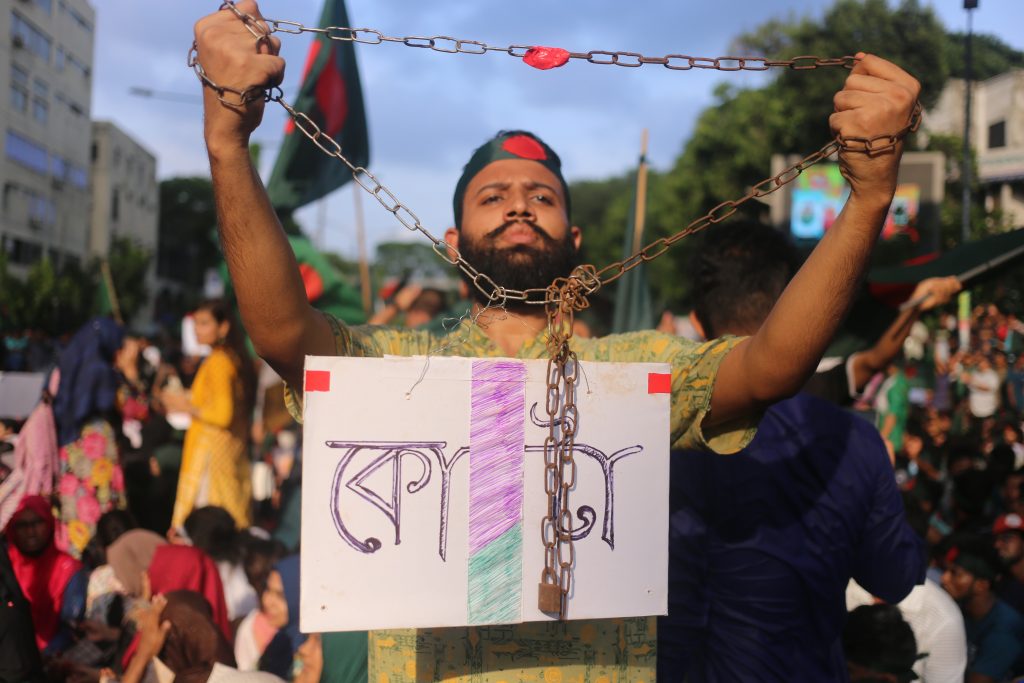The quota reform movement swayed students across the country on 2 July 2024 as they perceived that reinstating quota in government jobs by a court order is apparently a discrimination for meritorious students, hinting a growing wave of resistance.
On the second day of the student-led demonstration, demanding the reinstatement of the 2018 circular abolishing quotas in first- and second-class public service recruitment, Dhaka’s Shahbagh intersection once again turned into an epicenter of a mass demonstration.
The uprising unfolded with a massive leap in scale as the anti-discrimination student movement, initially centered around Dhaka University, transformed into a coordinated national protest for abolishing the quota system.
Students and job-seekers brought out a massive protest rally and occupied Shahbagh intersection with a vow to remain on the streets until their demands are fulfilled, marking a significant escalation in the ongoing movement against what they termed a discriminatory quota policy.
The rally began in front of the Dhaka University Central Library around 2:45pm with thousands of demonstrators from different universities and colleges, and marched towards Shahbagh through Nilkhet, Science Lab, and Bata Signal.
The procession turned into a mass sit-in as protesters blocked the key intersections, halting vehicular movement and drawing attention to their core demand-the immediate reinstatement of the 2018 circular that ensured merit-based recruitment in government services.
The protesters carried placards and chanted slogans, including “No quota, only merit,” “Reinstate the 2018 circular,” “Down with quota discrimination,” and “Students will build a merit-based Bangladesh.”

The slogans echoed throughout the Shahbagh area as students stood in unity, demanding the government overturn the High Court’s verdict which declared a portion of the 2018 circular illegal and thus paved the way for returning the quota system.
Speaking at the protest rally, Nahid Islam, a key coordinator of the Anti-Discrimination Student Movement, said the protest was not merely about jobs or university students, but a matter of national concern.
“This is not just a movement of students and job seekers. This is a movement to uphold the ideals of the Liberation War. The quota for freedom fighters is being misrepresented. The spirit of the Liberation War is not hereditary-it is a value, a principle that belongs to the nation. As young citizens, we carry that spirit forward, and that is why we are standing against inequality,” he said.
“This is a united movement. We want every campus to raise the same voice at the same time,” he added.
Student leaders stated that the protest would continue until July 4, the date of the next hearing on the High Court ruling.
Abdul Kadir, a student of Sociology, said during the protest that the students were determined to continue their movement regardless of weather or obstacles.
“This is a just and peaceful movement. We will not leave the streets until the demands of the student community are met. We will endure the burning sun and rain if necessary,” he said.
Simultaneous protests were held at several universities across the country. At Jahangirnagar University, students brought out a rally from the central library premises and marched through campus before blocking the Dhaka-Aricha highway for about 25 minutes.
The demonstration ended with a gathering at the university’s main gate, where speakers reiterated their demand and the elimination of what they called ‘illogical and discriminatory’ quota benefits.
At Islamic University in Kushtia, general students held a protest rally around 11am under the banner of “General Students.” The rally began at the Jhal Chattar and marched through the main roads of the campus before ending at the same point. During the programme, students reiterated their opposition to the reintroduction of quota-based recruitment and reaffirmed their commitment to a merit-based system.
The core demand of the movement is the reinstatement of the circular issued by the Ministry of Public Administration on October 4, 2018, which had abolished the quota system in government jobs, ensuring merit-based recruitments.
Protesters also urged the government to form an independent commission to ensure that no unjust or discriminatory quota systems remain in place in any grade of public service, except disadvantaged communities as their rights are ensured by the Constitution.
They also demanded that no candidate can use quota privileges more than once and the seats reserved for quotas remained vacant then those seats will be filled with merit-based candidates to ensure efficiency and fairness in recruitment. Furthermore, they called for effective measures to build a transparent, corruption-free and merit-based civil service.


